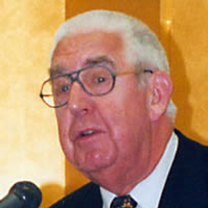The 3rd Award Profile of the Recipient

Name
Johannes Jacobus Broerse

Name
Johannes Jacobus Broerse
● Major Academic and Work Background :
Oct. 12, 1934 Born in Amsterdam the Netherlands
1959 Graduated from University of Amsterdam.
1961 to 1973 Radiobiological Institute TNO, Rijswijk
1974 Research associate Stanford University, USA.
1974 to 1991 Radiobiological Institute TNO, Rijswijk
1986-Present Part-time professor of Leiden University
1991- present Advisor TNO Chtre for Radiobiological
Protection and Dosimetry, DeIf
● Awards
1976 Award of the “Damon Runyon Memorial Fund”
1999 Baeq and Alexander Award
● Major Activities
He has published a large number of papers in the following fields, and has established neutron dosimetry and neutron
radiobiology.
- Dosimetry: neutron dosimetry, comparative dosimetry studies use of biological dosemeters,dosimetry for diagnostic
procedures. - Radiobiology: effects of different types of radiation on biological systems, relative biological effectiveness as
function of radiation quality, fundamental aspects of dose-efrect relations for cell death and tumor induction. - Diagnostic radiology: studies on radiation dose and image quality during diagnostic prcoedures.
He has also contributed to the society as chairman of the following committees.
Committee on Dosimetry Standardization (EULEP), 1970- 1990
Report Committee on Neutron Dosimetry for Biology and Medicine, of the International Commission on Radiation Units
and Measurements (ICRU), 1972- 1977
Collection and Evaluation of Physical Data for Neutron Dosimetry (CENIDOS), EURATOM,1974- 1978.
Committee European Neutron Dosimetry lntercomparison Project (ENDIP) EURATOM,1975-1978.
European Clinical Neutron Dosimetry Group (ECNEU), 1976-1980.
● Major reason for reccommendation
As a physicist, Professor Dr. Broerse has been established himself in the fields of fundamental research in radiobiology and radiation protection, and published a large number of reports of his’studies on neutron Dosimetry and radiobiology.
Especially, his publication of the fIrst measurement Of oxygen enhancement ratio (1964) and the results of his research on relative biological effectiveness (RBE) are highly evaluated in the world.
He advanced a research on radiation carcinogenesis caused by exposure to neutrons in rats and rhesus monkeys and analyzed risk of radiation. He is a recognized authority on risk factors and RBE of neutron, and has obtained a world’s recognition. His achievements on these fields provide useful data in order to analyze the effects of A-bomb radiations on survivors, especially the effects of neutrons.
Thus, Professor Dr. Broerse’s fundamental research on radiation risk has widely contributed to the promotion of Hibakushas’Medical Care, and we have reached at the agreement in choosing Professor Dr. Broerse as the winner for the 3rd Annual Nagasaki Dr. Nagai Peace Memorial Prize.
